In Manhattan, LGBTQ activists warn World Bank against funding Uganda
Queer Ugandans, health advocates, and others descended on Uganda’s Permanent Mission to the UN in Manhattan on Sept. 26 to protest the country’s brutal anti-LGBTQ policies and warn the World Bank against financing projects in the African nation. The World Bank delivers loans and grants to lower-income countries, including Uganda, but the bank announced in … Read More
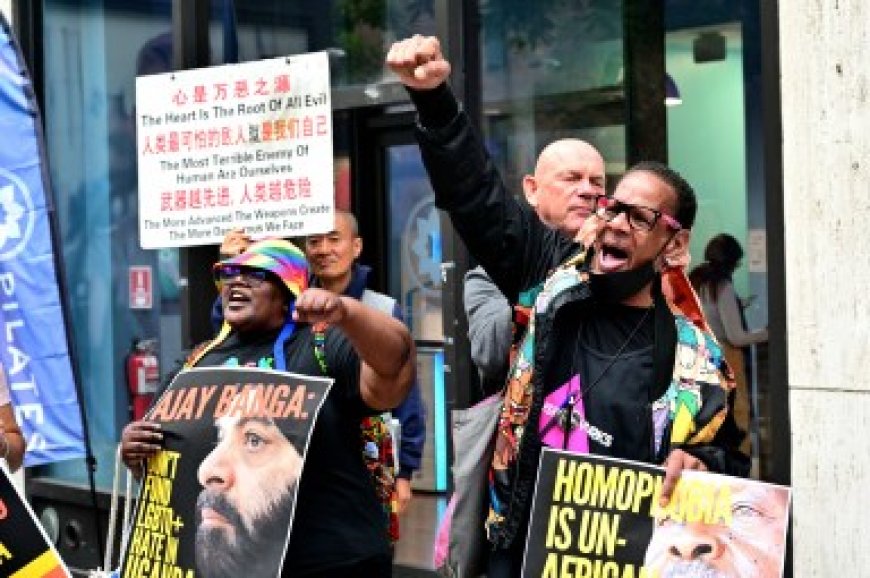
Queer Ugandans, health advocates, and others descended on Uganda’s Permanent Mission to the UN in Manhattan on Sept. 26 to protest the country’s brutal anti-LGBTQ policies and warn the World Bank against financing projects in the African nation.
The World Bank delivers loans and grants to lower-income countries, including Uganda, but the bank announced in August of 2023 that it was halting new loans to Uganda in response to the country’s passage of the Anti-Homosexuality Act of 2023, which calls for life sentences to those who engage in same-sex sexual activity and the death penalty for individuals found to be guilty of “aggravated homosexuality.”
In addition to fears over safety, advocates have brought attention to concerns around the draconian law’s impact on the delivery of HIV/AIDS services in Uganda, especially given the fears of LGBTQ community members who are reluctant to seek medical assistance. Among those on hand at the Manhattan demonstration included ACT UP, Housing Works, Health GAP (Global Access Project), and the AIDS Vaccine Advocacy Coalition (AVAC).
A year after the law’s passage, there are concerns that the bank is reconsidering its approach. Reports from earlier in the week — including a story by Bloomberg — indicated that the World Bank was exploring a compromise on the issue in order to resume its financing operations in Uganda. Activists who attended the demonstration in Manhattan held signs reading phrases such as “World Bank: Don’t restart lending to Uganda” and “repeal the anti-LGBTQ+ law.”
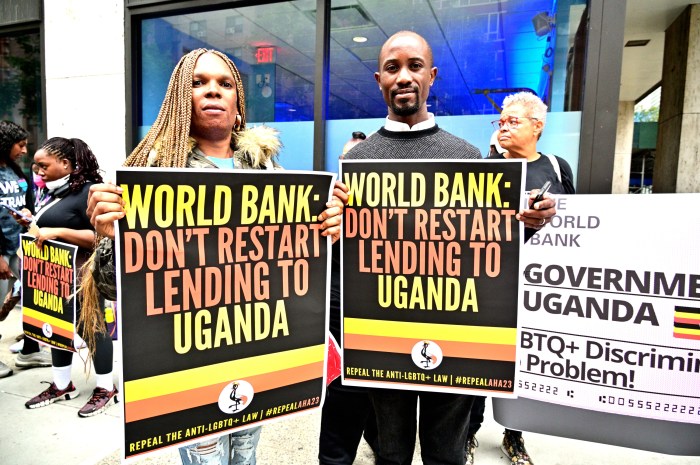
“There can be no business as usual between the World Bank and the Government of Uganda while this law remains in force,” Clare Byarugaba of Chapter 4 Uganda and Convening for Equality said in a written statement.
A World Bank spokesperson told Gay City News on Sept. 27 that the bank “will not propose any new public funding for Uganda to our board until we are satisfied that additional mitigation measures are in place.” The mitigation measures, the bank said, “have been designed to ensure beneficiaries of Bank financed projects are not discriminated against and receive equal access to services.”
Advocates aren’t buying the World Bank’s rationale. More than 100 groups — including local New York-based organizations like Housing Works and ACT UP NY as well as national and international groups — signed a letter on Sept. 16 urging the bank to avoid resuming business in Uganda and expressing “alarm” over the World Bank’s “plan for mitigation measures in Uganda.”
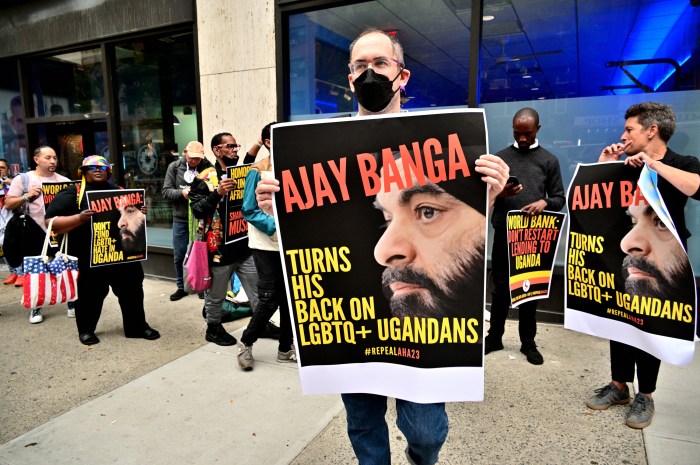
The letter said such measures would be flawed and would amount to a setback in the broader fight against discrimination in Uganda and elsewhere.
“The World Bank’s mitigation measures are a façade designed to provide the illusion of protection,” Richard Lusimbo, the director general of Uganda’s Key Population Consortium, said in a written statement. “They rely on perpetrators of discrimination — the government of Uganda — to implement the measure fairly. How can they be taken seriously?”
The international attention on Uganda’s anti-LGBTQ policies also involves Russia, which has also passed notorious anti-LGBTQ policies and steered financial resources to Uganda to help fight against pressure from the west on LGBTQ and reproductive rights, according to the Wall Street Journal. Russia allegedly provided $300,000 to support a conference organized by an anti-LGBTQ Arizona-based organization, Family Watch International, and Russia’s ambassador to Uganda met with Antia Among, the speaker of Uganda’s parliament, encouraging her to speed up the anti-LGBTQ law.
The World Bank says it worked carefully on mitigation measures to ensure what they describe as inclusion and non-discrimination in bank-financed projects, including an independent monitoring mechanism. The bank has yet to set a date to examine the performance of the measures, and it is working with the Ugandan government — the same one that ushered in the bigoted law — to implement the mitigation measures.
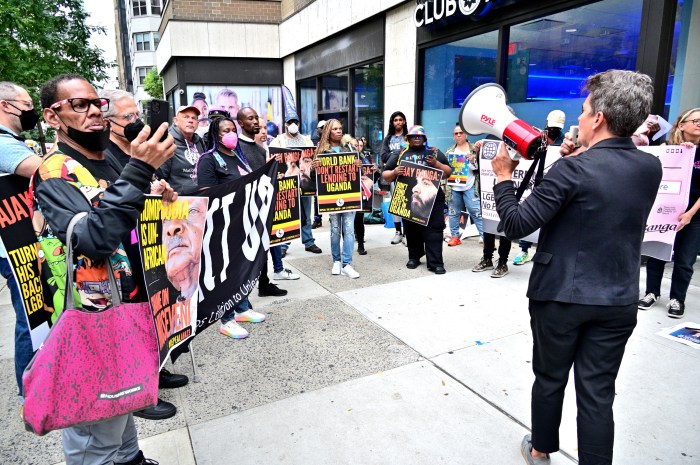
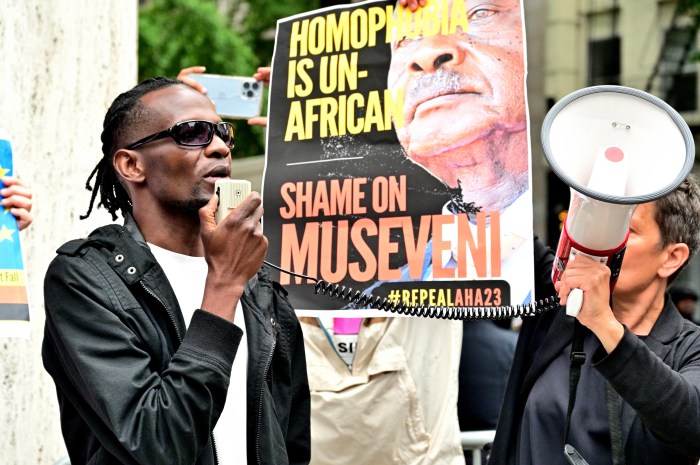
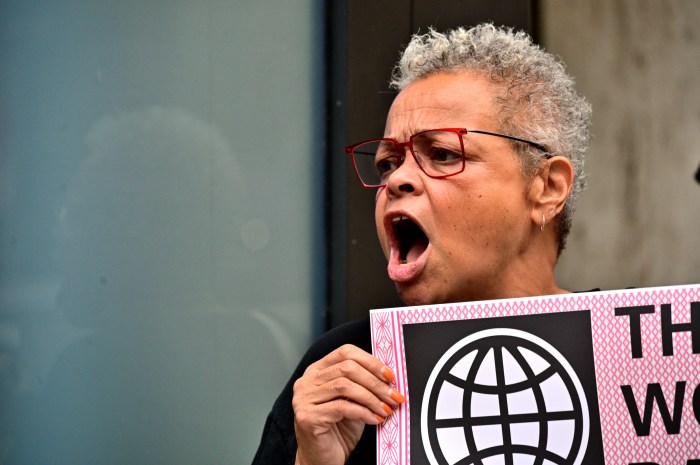

 Mark
Mark 





